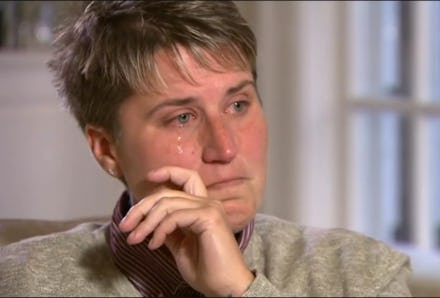White Mom's Lawsuit Over Black Baby Exposes Ugly Truths About White Privilege

What happens, exactly, when a white family that wants a white sperm donor gets a half-black child instead?
In the case of a lesbian couple from Ohio, it means a "wrongful birth" lawsuit against the sperm bank — two years after the fact. The lawsuit has apparently been prompted by the "racial problems" the parents are experiencing now that their child, 2-year-old Payton, is inching closer toward learning about the cruel, racist realities of American society. But there's another large issue sitting at the crux of what's otherwise a lawsuit about medical malpractice.
Dealing with blackness has become burdensome and inconvenient for these two white mothers — because the biracial baby completely upended their decades of enjoying the spoils of white privilege.
Jennifer Cramblett, a 36-year-old woman from Uniontown, Ohio, filed suit Sept. 29 against Chicago-area Midwest Sperm Bank because, according to the allegations, the clinic artificially inseminated and impregnated her with the wrong sperm. Cramblett told the Today Show that they chose a "blond hair, blue-eyed individual" so the child would closely resemble her partner.
Those dreams were dashed in April 2012, when Cramblett ordered more sperm from the chosen donor, for a second child the couple planned on having. It was then that Cramblett learned there may have been a mix-up. Not long after, it was confirmed she had been impregnated with the wrong donor's sperm.
But the alleged medical malpractice is only part of what the lawsuit is concerned with, as seen in the documents made public by the Chicago Tribune. The filings paint a picture of a white couple's discomfort with the admitted "steep learning curve" they have had to overcome in terms of understanding black people, black culture, black experiences and even how to do a black child's hair.
Image Credit: Chicago Tribune via Document Cloud
On page six of the lawsuit, for example, Cramblett describes living daily with the "fears, anxieties and uncertainty" about her child's future in their all-white, racially intolerant town, as well as within a culturally insensitive family. Cramblett acknowledges that she wasn't raised with a high degree of cultural competence about African-American people. She now complains about having to travel to a black neighborhood to get her daughter a decent haircut, where she's "not overtly welcome" because Payton has "hair typical of an African-American girl" and not the hair of the white child they wanted in the first place.
Still, Cramblett maintains that race is not an issue, despite the considerable amount of space taken up in court documents with respect to the racialized elements of the case.
"I don't find any problems with having a mixed-race child as far as I am concerned," Cramblett told NBC News, tearfully noting that she loves her biracial child and wants her to grow up in a more inclusive environment. "[Payton] will understand it wasn't about, 'We didn't want you. We wanted a white baby.' That wasn't what it was about."
Image Credit: Today Show
It wasn't until after the couple had had Payton, and embarked on the process of raising her for two years, that they entertained the idea of moving to a more racially inclusive environment, on the recommendation of Cramblett's therapists.
All of this, combined with the alleged malpractice, is why the couple is suing for a to-be-determined amount of more than $50,000 for having suffered "personal injuries, medical expense, pain, suffering, emotional distress and other economic and non-economic issues, and will do so in the future."
Translation: They didn't ask for their comfortable, white privileged way of life to be nearly eviscerated by blackness.
Fortunately, according to the lawsuit, Cramblett seems aware of research showing that racist environments negatively affect overall well being for non-white children. She told the Today Show that she wants to use the money to underwrite expenses for the family's relocation to a more inclusive environment.
But what if the child had been born white? Presumably, they would have had no problem raising that child in an environment they admit is unwelcoming of non-whites and not the most accepting of LGBT people.
Image Credit: Julius Burke via YouTube
There are many layers to this lawsuit. As Cramblett told NBC News, one can't make a mistake like this and tell two first-time lesbian parents they should "just be happy" that they now have a baby, especially since they can't reproduce on their own. And no clinic, let alone any individual, should ever go against a woman's wish for what she wants to do with her body. If she chose a particular sperm donor, that's who she should've gotten. After all, Cramblett was a paying customer.
But that aspect has clearly become jumbled up with a white couple's inability to cope with blackness, even within their own family. This confusion reveals a sad truth many blacks have known for generations, and one that their child will unfortunately learn when she gets older — that white people almost never have to seriously interrogate how white privilege and institutional racism make many social spaces violently unsafe for black people.
Until that is, they're forced to confront their privilege by circumstances out of their control.